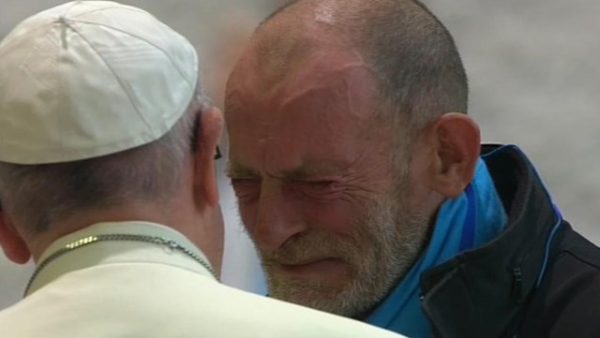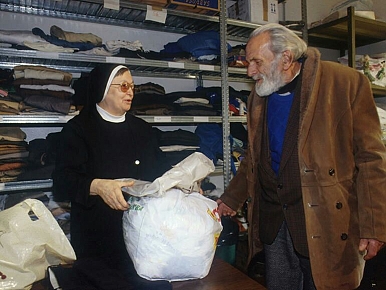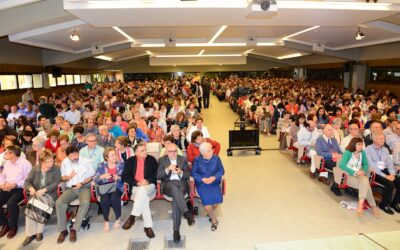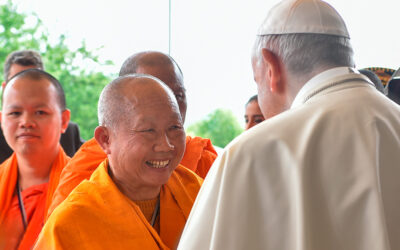 “A Church of the poor means two things mainly: the Church should be poor as Christ was poor, if it wants to proclaim the kingdom of God, if it wants its message to be effective. And all Christians who share in the life of the Church should be poor in spirit. Then the message of salvation would be more easily accepted by the poor; whereas, for the rich it will be difficult to enter the kingdom of Heaven than for a camel to go through the eye of a needle…. This Church of and for the poor should not make us imagine any similar socio-political version of it for the world. (…) When Jesus speaks of the poor, he means those who are being tested, who are humble, who are deprived of reassurance and beyond any real support that they can depend on – yet, they turn to God their just benefactor. The Greek translators of the Bible understood that the poverty of these poor was not merely material deprivation; in fact, they did not translate the Hebrew word anaw (poor), as ‘pauper’ or ‘destitute’ but preferred to use the word praus, which evokes meekness and resignation in the midst of hardship and trial.
“A Church of the poor means two things mainly: the Church should be poor as Christ was poor, if it wants to proclaim the kingdom of God, if it wants its message to be effective. And all Christians who share in the life of the Church should be poor in spirit. Then the message of salvation would be more easily accepted by the poor; whereas, for the rich it will be difficult to enter the kingdom of Heaven than for a camel to go through the eye of a needle…. This Church of and for the poor should not make us imagine any similar socio-political version of it for the world. (…) When Jesus speaks of the poor, he means those who are being tested, who are humble, who are deprived of reassurance and beyond any real support that they can depend on – yet, they turn to God their just benefactor. The Greek translators of the Bible understood that the poverty of these poor was not merely material deprivation; in fact, they did not translate the Hebrew word anaw (poor), as ‘pauper’ or ‘destitute’ but preferred to use the word praus, which evokes meekness and resignation in the midst of hardship and trial.  These poor, according to the Gospel, are also found among the privileged classes. Matthew’s Gospel tells us about Joseph of Arimathea, ‘a wealthy man and disciple of Jesus’ (27:57). He was also detached from his possessions; he was also poor and humble. (…) In his Apologeticum, Tertullian described the Christians of his day as those who did not aspire to or fight for positions in politics, even minor ones, because they were not motivated by personal ambition. On the other hand we find that many, who are economically disadvantaged, turn to messages they receive from outside the Church and support them. (…) This is why the Second Vatican Council invites us to think over our Christian living. Is it genuine? Does it bear the marks of poverty and humility? Poverty should result from love. Love is what will lead us to place our possessions at the disposal of the poor and needy. It is Christian love that banishes egoism and gives birth to communion. (…) Then the Church of the poor becomes the Church of communion between the rich that become poor and the poor that bring their needs, for the building of the Church together. (…) If we want that Church of the poor to return to taking on a role of witnessing in the process of evangelization, it will have to resurface at all levels of Christian life beginning from every point of the Church, from above and from below, from periphery to centre. (…) This will also have a reflection on the social and political level in new reforms that will be fundamentally Christian, if they are inspired by freedom. Some more sensitive spirits are not satisfied and still cry out that the Church must make itself poorer. (…) When someone makes a justified request, even when it is presented in a disorderly or bad manner, it is wise to wonder whether what is being asked might not be a spur to accelerate this process of renewal without which the Good News cannot be brought to all the peoples of the earth in a way that is genuinely helpful. Desiring peace, poverty, communion of goods as the outward signs of a communion of spirits – these are not allegations meant to frighten us: they are what spur us on along the path of the Gospel.” From: Pasquale Foresi, Problematica d’oggi nella Chiesa (Rome: Città Nuova Editrice, 1979).
These poor, according to the Gospel, are also found among the privileged classes. Matthew’s Gospel tells us about Joseph of Arimathea, ‘a wealthy man and disciple of Jesus’ (27:57). He was also detached from his possessions; he was also poor and humble. (…) In his Apologeticum, Tertullian described the Christians of his day as those who did not aspire to or fight for positions in politics, even minor ones, because they were not motivated by personal ambition. On the other hand we find that many, who are economically disadvantaged, turn to messages they receive from outside the Church and support them. (…) This is why the Second Vatican Council invites us to think over our Christian living. Is it genuine? Does it bear the marks of poverty and humility? Poverty should result from love. Love is what will lead us to place our possessions at the disposal of the poor and needy. It is Christian love that banishes egoism and gives birth to communion. (…) Then the Church of the poor becomes the Church of communion between the rich that become poor and the poor that bring their needs, for the building of the Church together. (…) If we want that Church of the poor to return to taking on a role of witnessing in the process of evangelization, it will have to resurface at all levels of Christian life beginning from every point of the Church, from above and from below, from periphery to centre. (…) This will also have a reflection on the social and political level in new reforms that will be fundamentally Christian, if they are inspired by freedom. Some more sensitive spirits are not satisfied and still cry out that the Church must make itself poorer. (…) When someone makes a justified request, even when it is presented in a disorderly or bad manner, it is wise to wonder whether what is being asked might not be a spur to accelerate this process of renewal without which the Good News cannot be brought to all the peoples of the earth in a way that is genuinely helpful. Desiring peace, poverty, communion of goods as the outward signs of a communion of spirits – these are not allegations meant to frighten us: they are what spur us on along the path of the Gospel.” From: Pasquale Foresi, Problematica d’oggi nella Chiesa (Rome: Città Nuova Editrice, 1979).
Help each other in every way
Help each other in every way




0 Comments